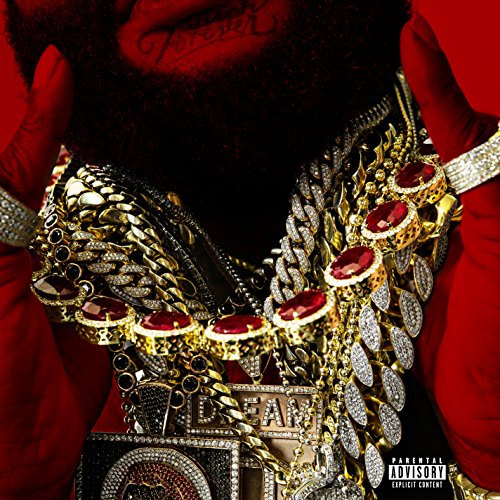
Rick Ross
Hood Billionaire
Release Date: Nov 24, 2014
Genre(s): Rap, Gangsta Rap, Southern Rap
Record label: Def Jam
Music Critic Score
How the Music Critic Score works
Buy Hood Billionaire from Amazon
Album Review: Hood Billionaire by Rick Ross
Acceptable, Based on 10 Critics
Based on rating 7/10
With the November release of Hood Billionaire, platinum rapper Rick Ross had put up two albums in 2014, having already dropped the superior effort Mastermind in March. This album's lumbering and epic single, "Elvis Presley Blvd." with Project Pat, also leaked in the summer, making the whole year feel like a Maybach Music festival, where cocaine and caviar were in endless supply. Whether or not this justifies the padding and shagginess found on Hood Billionaire all depends on the listener's hunger for Ross and his slick brand of thug music, and yet the album is quite self-aware, putting a two-minute intro up front to act as hater repellent.
Based on rating C
“Call from Kenneth Williams, an inmate at a federal prison,” an automated voice states on the “Intro” of Rick Ross’ Hood Billionaire. After accepting the call, Ross connects with Kenneth “Boobie” Williams, an imprisoned Miami gangster who supposedly guided Ross as a youth. Hood Billionaire isn’t a concept album, but Ross uses these soundbites to (loosely) tie the album together.
Based on rating 5/10
In the age of microwavable big budget hip-hop albums, disc-bulging products that have every hope of being chopped apart by an iPod owner’s Genius playlists or Spotify subscriber’s radio preferences, I have to thank Rick Ross for opening this album with a two minute say nothing skit about loading bags of coke into his trunk. I have to thank him because he’s already released one album this year, the first winter’s Mastermind, and by opening this album with such a focused slice of bland conversation he’s signaling that this album will not be following the formula as that album did. No, Hood Billionaire is in fact the exact opposite of Ross’ last two efforts, an album so focused that of its 16 tracks only two or three cuts could be heard as anything other than drug rap.
Based on rating 5/10
Releasing two full-length records in a span of eight months is a commendable feat for any artist, let alone Rick Ross. His explanation for the prompt return to the studio was simply because "That's what bosses do," another quotable built to fuel the man's kingpin persona. March's Mastermind was the record that found Ross in need of a reinvention, with his aforementioned image wearing thin from speculation whether his lyrical content is as autobiographical as he'd like listeners to believe.
Based on rating 2.5/5
Hood Billionaire is the second album of 2014 for Rick Ross. This stands in contrast to 2014s now well documented trajectory of A-listers holding back on their projects until 2015. Instead, Rozay is stepping out to the forefront with a project that is a diluted version of his initial 2014 offering Mastermind, which itself lacked the mythic grandiosity of his previous works.
Based on rating 2/5
Rick Ross – a man of XL fantasies, XL luxury and XL bass – is, of course, the only rapper brazen enough to drop two full-length albums in a year when no one's going platinum unless they're named Taylor Swift. Sadly, though, the Miami MC's seventh LP explodes with none of the ambition or scope of March's Mastermind – playing it safe, like a knockoff version of Jay Z's back-to-basics speed bump American Gangster, from 2007. The beats recall hits Ross made nearly a decade ago, the lyrics trade in the simplistic flows he outgrew long ago, and he is rarely roused from his comfort zone, even with Timbaland playing 808 pinball on the standout "Movin' Bass." .
Opinion: Fairly Good
If I liked Rick Ross even half as much as I liked making Rick Ross fat jokes, I would be thrilled to review his new album. But I don't so I'm not. Truth be told, real talk, keeping it one hunnid, if it were up to me, I'd be reviewing one of the other seven million projects released today (seriously go look at how many dropped today), but I'm not. I have this food-analogy loving, beard-rocking boss who makes me do things like get high and listen to rap music.
Opinion: Average
Everything about Rick Ross is big. This has been the story since his first record—big voice, big man, big appetites. It’s no coincidence, then, that his artistic apex was also the moment he finally made a record as IMAX-sized as his persona, 2010’s Teflon Don. An atomic bomb of a single like “B.M.F.” had the feel of inevitability: AC/DC was never going to be a bar band, and Rick Ross was never going to be a mixtape rapper.
Opinion: Average
Rick Ross may never again reach the heights of “Teflon Don,” the 2010 album that announced his arrival as one of hip-hop’s essential characters: a mountainous man with a mountainous ego with the mountainous songs to match. Maximalism was his mode, and it served him well. Yet for some reason, he’s never been quite so large since. He’s tried introspection.
Opinion: Mediocre
Rick Ross’s insular, drug-obsessed seventh record unintentionally evokes the scene in “Scarface” where Tony Montana, isolated and a caricature of his former self, realizes the world is passing him by as he sits in front of a mountain of cocaine. A mere half-year after his bloated “Mastermind,” Ross offers more redundant songs about moving coke and stacking money. Only the incensed “Burn” resonates; elsewhere, “Coke Like the ’80s” and “Neighborhood Drug Dealer” are blustery narratives with little imagination.
'Hood Billionaire'
is available now

